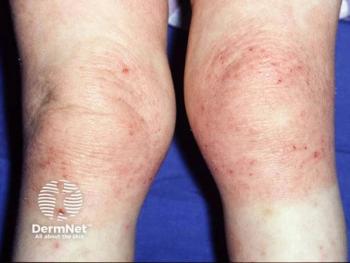
Pfizer Reports Topline Results from Trial Comparing Abrocitinib to Dupilumab for AD
Pfizer’s JADE DARE phase 3 trial met its coprimary and key secondary efficacy endpoints.
Pfizer has announced that its phase 3, 26-week, randomized, double-blind, double-dummy, active-controlled, multi-center trial (JADE DARE; B7451050) has met its coprimary and key secondary efficacy endpoints,
The study compared the efficacy and safety of abrocitinib (PF-04965842; Pfizer) 200 mg to dupilumab (Dupixent; Sanofi and Regeneron) 300 mg in adult patients on background topical therapy with moderate to severe atopic dermatitis (AD).
Abrocitinib is an oral small molecule that inhibits Janus kinase (JAK) 1, which is thought to regulate the cytokines involved in the pathophysiology of AD including interleukin (IL)-4, IL-13, IL-31, IL-22, and thymic stromal lymphopoietin (TSLP).
“The results from our first formal head-to-head trial for abrocitinib illustrate its potential for meaningful symptom relief for patients and further build upon the substantial body of data from the JADE development program,” said Michael Corbo, PhD, chief development officer, inflammation and immunology, Pfizer global product development, New York, New York. “We’re pleased that the study findings show the potential impact abrocitinib could have to help people living with moderate to severe atopic dermatitis in reducing their itch significantly and in achieving near complete skin clearance.”
In the trial, abrocitinib was administered once daily by oral tablet and dupilumab was administered by subcutaneous injection every other week following a 600 mg induction dose.
The coprimary endpoints of the trial were the proportion of patients who achieved at least a 4-point improvement in the severity of Peak Pruritus Numerical Rating Scale (PP-NRS4) from baseline to week 2 and the proportion of patients who achieved Eczema Area and Severity Index (EASI)-90 at week 4. The key secondary endpoint was the proportion of patients at week 16 who achieved EASI-90. This study will continue so efficacy can be studied in patients at month 6.
According to the release, the percentage of patients treated with abrocitinib who experienced adverse events (AEs) was larger than those treated with dupilumab. There was a similar number of patients who experienced AEs, serious AEs, and severe AEs that lead to discontinuation between both arms.
There were 2 patient deaths that happened during the study in the abrocitinib 200mg treatment arm, which the researchers defined as unrelated to the study drug. Of the deaths, 1 was attributed to COVID-19 and the other was attributed to an intracranial hemorrhage and cardiorespiratory arrest and was classified as a major adverse cardiovascular event (MACE). There were no cases of malignancies or venous thromboembolism (VTE) events confirmed through adjudication. This safety profile of abrocitinib was consistent with previous studies in the JADE program.
This study is a part of the JAK1 Atopic Dermatitis Efficacy and Safety (JADE) global development program for abrocitinib and full results from JADE DARE will be submitted to medical meetings and journals at a later date.
Reference:
1. Positive top-line results from Pfizer’s phase 3 JADE DARE trial comparing the efficacy of abrocitinib and dupilumab for moderate to severe atopic dermatitis | Pfizer. Accessed August 31, 2021. https://www.pfizer.com/news/press-release/press-release-detail/positive-top-line-results-pfizers-phase-3-jade-dare-trial
Newsletter
Like what you’re reading? Subscribe to Dermatology Times for weekly updates on therapies, innovations, and real-world practice tips.











